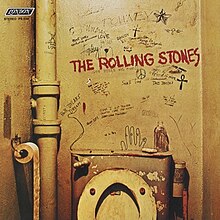
Back Beggars Banquet Czech Beggars Banquet Danish Beggars Banquet German Beggars Banquet Greek Beggars Banquet Spanish Beggars Banquet Finnish Beggars Banquet French Beggars Banquet HE Beggars Banquet Croatian Beggars Banquet Hungarian
| Beggars Banquet | ||||
|---|---|---|---|---|
 Original LP cover | ||||
| Studio album by | ||||
| Released | 6 December 1968 | |||
| Recorded | 17 March – 25 July 1968 | |||
| Studio | Olympic, London;[1] Sunset Sound, Los Angeles | |||
| Genre | ||||
| Length | 39:44 | |||
| Label | Decca (UK) · London (US) | |||
| Producer | Jimmy Miller | |||
| The Rolling Stones chronology | ||||
| ||||
| Alternate cover | ||||
 The "toilet" cover, rejected for the original LP, but used on subsequent reissues | ||||
| Singles from Beggars Banquet | ||||
| ||||
Beggars Banquet is a studio album by the English rock band the Rolling Stones, released on 6 December 1968 by Decca Records in the United Kingdom and London Records in the United States. It was the first Rolling Stones album produced by Jimmy Miller, whose production work formed a key aspect of the group's sound throughout the late 1960s and early 1970s.
Brian Jones, the band's co-founder and early leader, had become increasingly unreliable in the studio due to his drug use, and it was the last Rolling Stones album to be released during his lifetime, though he also contributed to two songs on their next album Let It Bleed, which was released after his death (Jones also contributed to the group's hit song "Jumpin' Jack Flash", which was part of the same sessions, and released in May 1968). Nearly all rhythm and lead guitar parts were recorded by Keith Richards, the Rolling Stones' other guitarist and the primary songwriting partner of their lead singer Mick Jagger; together the two wrote all but one of the tracks on the album. Rounding out the instrumentation were bassist Bill Wyman and drummer Charlie Watts, though all members contributed on a variety of instruments. As with most albums of the period, frequent collaborator Nicky Hopkins played piano on many of the tracks.
Beggars Banquet marked a change in direction for the band following the psychedelic pop of their previous two albums, Between the Buttons and Their Satanic Majesties Request.[2] Styles such as roots rock and a return to the blues rock sound that had marked early Stones recordings dominate the record, and the album is among the most instrumentally experimental of the band's career, as they use Latin beats and instruments like the claves alongside South Asian sounds from the tanpura, tabla and shehnai, and African music-influenced conga rhythms.
Beggars Banquet was a top-ten album in many markets, including a number 5 position in the US—where it has been certified platinum—and a number 3 position in the band's native UK. It received a highly favourable response from music critics, who deemed it a return to form. While the album lacked a hit single at the time of its release, songs such as "Sympathy for the Devil" and "Street Fighting Man" became rock radio staples for decades to come. The album has appeared on many lists of the greatest albums of all time, including by Rolling Stone, and it was inducted into the Grammy Hall of Fame in 1999.
- ^ Brown, Phill (July 2000). "Phill Brown, Recording the Rolling Stones' Classic, Beggar's Banquet". tapeop.com. TapeOp. Archived from the original on 19 July 2016. Retrieved 27 July 2016.
- ^ a b Lester, Paul (10 July 2007). "These albums need to go to rehab". The Guardian. London. Archived from the original on 10 January 2014. Retrieved 21 July 2013.
- ^ Dimery 2011, p. 130.
- ^ Luhrssen & Larson 2017, p. 305.
- ^ "Rolling Stones singles".
© MMXXIII Rich X Search. We shall prevail. All rights reserved. Rich X Search